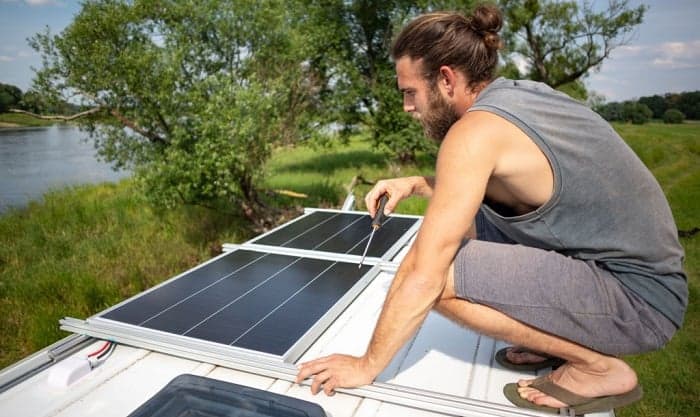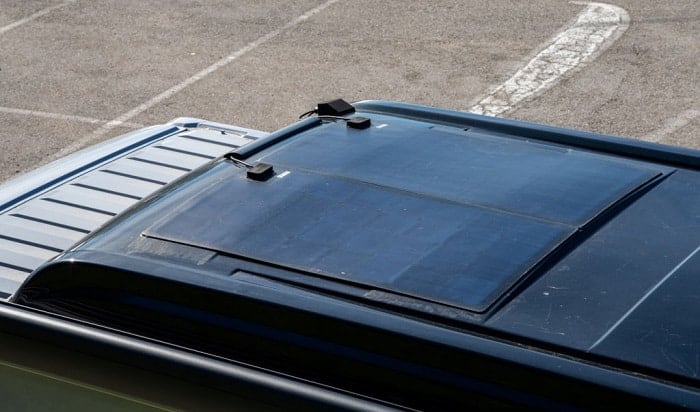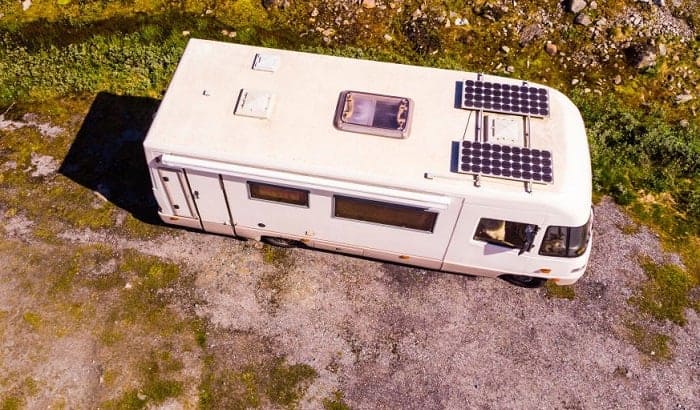If you’re fond of camping and prefer to go solar, firstly, you have to answer the question, how many solar panels do I need for my RV? There are different methods on how to compute your recreational vehicle’s power requirements. One of these methods is to go camping for a few days without utilizing your AC generator.
All you need to do is to point out how long it takes to run your recreational vehicle during normal usage by utilizing batteries only, without a generator. To learn more about the number of solar panels needed for your RV, continue reading the rest of this post.
Table of Contents
- How Many Solar Panels Do I Need for My RV
- Factors That Determine the Number of Solar Panels for Your Recreational Vehicle
- How Much Battery Do You Need
- What are the Limitations to an RV Solar Panel System Design That You Need to Consider
- Is It Beneficial to Install Portable RV Solar Panel Kits
- The Basics for Installing Portable Solar Systems for RV
- Conclusion
How Many Solar Panels Do I Need for My RV
Which is the right solar panel for RV battery? The numbers of solar panels you will need are:
- A minimum of 300-watts of solar panels if you have one 12V battery with roughly 100AH.
- A minimum of 400-watts solar panels if you have a couple of 12V batteries or 2 six golf cart volt batteries with about 200 up to 250 AH.
- A minimum of 600-watts of solar panels if you have four six-volt golf cart batteries containing between 400 and 600 AH or four twelve-volt batteries.
Such recommendations were founded on the metric to generate 30 AH of battery charge utilizing a 100W solar panel, between five to nine hours of exposure to sunlight.
Please be guided that the standard solar panel found on most recreational vehicles ranges from 150W to 200W.
Meanwhile, to learn more about how to size your recreational vehicle solar and batteries, you might want to consider watching this helpful video:
Factors That Determine the Number of Solar Panels for Your Recreational Vehicle
It is essential to inspect the specifications of a particular recreational vehicle solar panel system. When examining the specifications, see to it that you carefully assess the following:
Peak Power (amps)
This pertains to the maximum power gauged in amps that the solar panel can generate when utilized in full sunlight. For instance, if the solar panel has a 5-amp peak power rating and you anticipate delighting in six-hour sunlight daily, then assume a daily charging rate of approximately 30 amp-hours.
Meanwhile, if you intend to utilize a solar charge regulator, it’s necessary to be insightful of the solar array’s consolidated peak power rating. This way, you can select a regulator that comes with a precise amp rating.
Watt Rating
It would be best if you inspected the watt rating of each solar panel and the total watts. In doing so, you could size the solar panel system precisely.
Tolerance
This is another valuable factor to look into for solar panels. It has a significant effect on the power that your solar panel can generate. A panel might supply three percent more or three percent less power if it comes with a -3%/+3% power tolerance.
Hence, obtaining the percentage number could remarkably assist you in computing the number of watts you will need every day more accurately.
Peak Power (volts)
This one pertains to the maximum power gauged in volts that the solar panel system can generate in full sunlight. It is a substantial factor to consider because solar panels are more likely less efficient than the maximum.
In addition, they have the potentiality of decreasing their output by up to 2 volts, which immensely impacts your charging rate. Take in mind that low-light conditions have the possibility of dropping the charging rate. Hence, it would be best if you looked into this spec before picking one.
How Much Battery Do You Need
Without any doubt, solar power is not the only important factor for you to think through for off-grid energy. The battery power is also a valuable factor that needs your attention. As you might already know, solar power works solely when the sun is out.
So, this implies keeping extra batteries in your recreational vehicle to conserve energy overnight is paramount. Deciding on how much battery you have will be up to you. Nonetheless, a minimum of a 24-hour worth of stored energy is highly recommended.
Fundamentally, there are two different types of batteries that you could choose from, lithium batteries and lead deep-cycle batteries.
- Lithium-ion batteries are adept in many applications and have the price point to prove this.
- Lead deep-cycle batteries are less expensive; however, they are prone to get damaged quickly, especially if you’re not well aware of their limitations. Remember that you must not allow lead deep-cycle batteries to get below half charge as this condition will bring severe and permanent damage.
What are the Limitations to an RV Solar Panel System Design That You Need to Consider
When building any solar system for your recreational vehicle, the three primary limitations that you need to look into are:
Space of the Recreational Vehicle
Recreational vehicles come with space restrictions. So, aside from the roof space for your solar panels, you need to consider the storage space for the batteries and electronics.
Maximizing the space and deciding where the solar components will be placed are critical factors linked to your solar design.
Weight of the Recreational Vehicle Solar
Sure thing, weight is crucial to any vehicle mainly because anything you add takes away from cargo and GVWR capacities. It is essential to know that some recreational vehicles have more capacities compared to others.
This is why it is essential to determine how much weight you could add to your RV before starting.
Cost
Not to mention, for most recreational vehicle owners, the total cost of the solar panel system is deemed the most significant limitation. Hence, it is just right that you stay within your budget.
However, you have to consider pricing out a solar system to understand its cost better.
Is It Beneficial to Install Portable RV Solar Panel Kits
There’s no denying that investing in flexible solar panels for RV can save us money and energy in the long term. Unlike generators, solar panels are advantageous since they do not comprise any moving components. Likewise, they work without irking sound or smell and don’t require complete maintenance.
The advantage of solar panels is that they supply you with clean, renewable, and safe energy all the time. Indeed, since they utilize the energy coming from the sun, you can enjoy free energy, which means it’s unnecessary to spend more on expensive fuel.
As mentioned, solar panels don’t produce annoying sounds or smells when running, so you can forget about disturbing your neighbors. In line with this, you can also avoid exhaust fumes coming from loud generators.
The Basics for Installing Portable Solar Systems for RV
The answer to how many solar panels are necessary for your recreational vehicle will largely depend on what you intend to run inside your RV. Remember that powering one outlet for charging your mobile phone will necessitate far less energy than powering a space heater.
Moreover, there are many kinds of recreational vehicle setups. Many of them come with separate electrical systems for coach functions and automotive functions.
Typically, you merely utilize coach functions if you already have installed a battery in your recreational vehicle. You can utilize this as a base for your solar panel system setup.
On the other hand, to uncover the number of solar panels needed, you have to come up with a reasonable inference of the amount of power your appliances will drain. You could consider this energy that runs your appliances using watt per hour or watts.
Conclusion
To conclude, solar power is unquestionably one fantastic means to consider if you wish to go off-grid for a while in your recreational vehicle. Nevertheless, it would be best to know the answer to “How many solar panels do I need for my RV?” and the following info:
- Ensure specific solar power requirements of your recreational vehicle
- The solar panels needed for your RV will primarily rely on what you plan to run
- Check the limitations of the RV solar design
Remember that using solar power for your RV is indeed a practical, beneficial, and cost-effective approach. But, be sure to consider the recommendations mentioned above so that you could select the solar panel that could satisfy your daily power requirements.

I am Kathleen Miller, staff writer and reviewer of the Avasolar team. Working with the team has been a pleasure for me so far, I hope to bring readers useful information by creating detailed and easy-to-follow contents.



